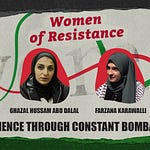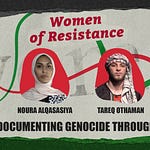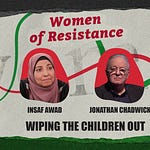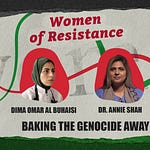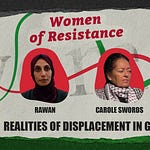Hayam Taha was 27. A pharmacist. A daughter. A boxer. A woman who had built something real—a life, a business, a community. She and her sister opened a pharmacy in Gaza, the kind of place where customers lingered for coffee, where friends dropped by not just for medicine but for conversation and care.
And then, in a single moment, it was gone.
In this second episode of Women of Resistance, presenter Sakina Datoo sits down with Hayam, a young woman whose life was obliterated after October 7. Her story is one of painful loss—of people, of place, of purpose. It is also a story of strength, of what it means to keep breathing in a world determined to suffocate you.
“I couldn’t even see a dust on the shelf,” Hayam says, remembering her pharmacy. “I left my heart there.”
Before the war, Hayam was like so many other Palestinian women: educated, ambitious, full of life. She had left Gaza once, to build a life abroad in Turkey—but the pull of home brought her back. “That’s the curse Gaza has on us,” she explains. “I had everything I wanted in Turkey—but I wasn’t happy.”
She returned. She chose Gaza.
Then came the bombs. Her best friend Khaled was killed. Her home was destroyed. The pharmacy—her pride, her joy—was flattened. “After Khaled,” she says, “I didn’t feel any loss anymore. Nothing could compare.”
Joined in the studio by social and political analyst Bushra Shaikh, the episode moves beyond personal tragedy to confront the wider implications. “Where are the feminists?” Bushra asks. “Why are the rights of Palestinian women so easily forgotten?”
Bushra’s words challenge the silence of Western institutions that speak loudly about women’s rights—until those women wear hijabs or live in Gaza. “We treat them as less,” she says. “And that’s a sickness of the modern world.”
Hayam, meanwhile, continues to fight—not for revenge, but for meaning. In the ashes of everything she once knew, she found a reason to rise again: her family, her community, those who still needed her. “It was like being born again,” she says. “I took baby steps.”
This is not a story of recovery. There is no happy ending. Gaza remains under siege, and the trauma has not passed. But in her quiet defiance, in her refusal to disappear, Hayam becomes a symbol of a different kind of resistance—one rooted not in politics, but in presence.
“I just want to die in peace,” she admits at one point. But she doesn’t. She chooses to live. And that, in Gaza, is resistance.




